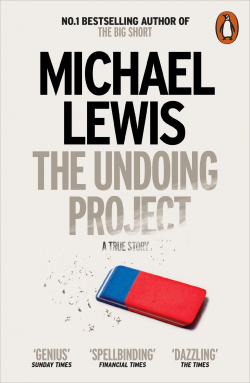
Citations sur The Undoing Project (10)
"It's hard to know how people select a course in life," Amos [Tversky] said. "The big choices we make are practically random. The small choices probably tell us more about who we are. Which field we go into may depend on which high school teacher we happen to meet. Who we marry may depend on who happens to be around at the right time of life. On the other hand, the small decisions are very systematic. That I became a psychologist is probably not very revealing. What kind of psychologist I am may reflect deep traits."
3. The Insider, p. 101
3. The Insider, p. 101
Israel without a psychology department was like Alabama without a football team.
3. The Insider, p. 87
3. The Insider, p. 87
Amos wrote an article, addressed directly to economists, to repair technical flaws in prospect theory. "Advances in Prospect Theory", it was called, and though Amos did much of the work on it with his graduate student Richard Gonzalez, it ran as a journal article by Danny and Amos. "Amos said that it had always been Kahneman and Tversky and that this had to be Kahneman and Tversky, and that it would be really strange to add a third person to it", said Gonzalez.
12 This cloud of possibility, p. 322
12 This cloud of possibility, p. 322
"The idea that it could make you better off to reduce your choices - that idea was alien to economics," he [Richard Thaler] said.
10 The isolation effect, p. 282
10 The isolation effect, p. 282
Danny was a pessimist. Amos was not merely an optimist ; Amos willed himself to be optimistic, because he has decided pessimism was stupid. When you are a pessimist and the bad thing happens, you live it twice, Amos like to say. Once when you worry about it, and the second time when it happens.
5 The Collision, p. 155
5 The Collision, p. 155
From his stint as a consultant, he learned something valuable, however. It seemed to him that a big part of a consultant's job was to feign total certainty about uncertain things.
I. Man boobs, p. 28
I. Man boobs, p. 28
As Danny told audiences in Israel, what was needed was a « transformation of cultural attitudes to uncertainty and to risk. »
9 Birth of the warrior psychologist, p. 248
9 Birth of the warrior psychologist, p. 248
Amnon [Rapoport] also had the best seat in the house when Amos [Tversy] dediced what he was going to do with his life. Hebrew University in the late 1950s required students to pick two fields of concentration. Amos had chosen philosophy and psychology. But Amos approached intellectual life strategically, as if it were an oil field to be drilled, and after two years of sitting through philosophy classes he announced that philosophy was a dry well. « I remember his words », recalled Amnon. « He said, « There is nothing we can do in philosophy. Plato solved too many of the problems. We can’t have any impact un this area. There are too many smart guys and too few problems left, and the problems have no solutions. » » The mind-body problem was a good example. How are our various mental events - what you believe, what you think - related to our physical states? What is the relationship between our bodies and our minds? The question was at least as old as Descartes, but there was still no answer in sight - at least not in philosophy. The trouble with philosophy, Amos thought, was that it didn’t play the rules of science. The philosopher tested his theories of human nature on a sample size of one - himself. Psychology at least pretended to be a science. It kept at least one hand at all times on hard data. A psychologist might test whatever theory he devised on a representative sample of humanity. Vos theories mighty be tested by others, and his findings reproduced, or falsified. If a psychologist stumbled upon a truth he might make it stick.
3. The Insider, p. 99-100
3. The Insider, p. 99-100
In a stroke, twenty-one-year old Danny Kahneman had exerted more influence upon the Israeli army - the institutions on which the society depended for its survival - than any psychologist had ever done or ever would do. The obvious next step for him was to go off and get his PhD and become Israel's leading expert in personality assessment and selection processes. Harvard was home to some of the leading figures in the field, but Danny decided, without anyone's help, that he wasn't bright enough to go to Harvard - and didn't bother to apply. Instead he went to Berkeley.
2. The Outsider, p. 83
2. The Outsider, p. 83
Whatever threat Danny felt to his existence he declined to acknowledge. "It looked very implausible - that we would defeat five Arab nations - but somehow we were not worried. There really was no sense of impeding doom that I could pick up. People were killed and so on. But, for me, after World War II, it was a picnic." His mother evidently did not agree, as she took her fourteen-year old son and fled Jerusalem for Tel Aviv.
2. The Outsider, p. 63
2. The Outsider, p. 63
Les Dernières Actualités
Voir plus
Autres livres de Michael Lewis (13)
Voir plus
Quiz
Voir plus
Quelle guerre ?
Autant en emporte le vent, de Margaret Mitchell
la guerre hispano américaine
la guerre d'indépendance américaine
la guerre de sécession
la guerre des pâtissiers
12 questions
3190 lecteurs ont répondu
Thèmes :
guerre
, histoire militaire
, histoireCréer un quiz sur ce livre3190 lecteurs ont répondu























